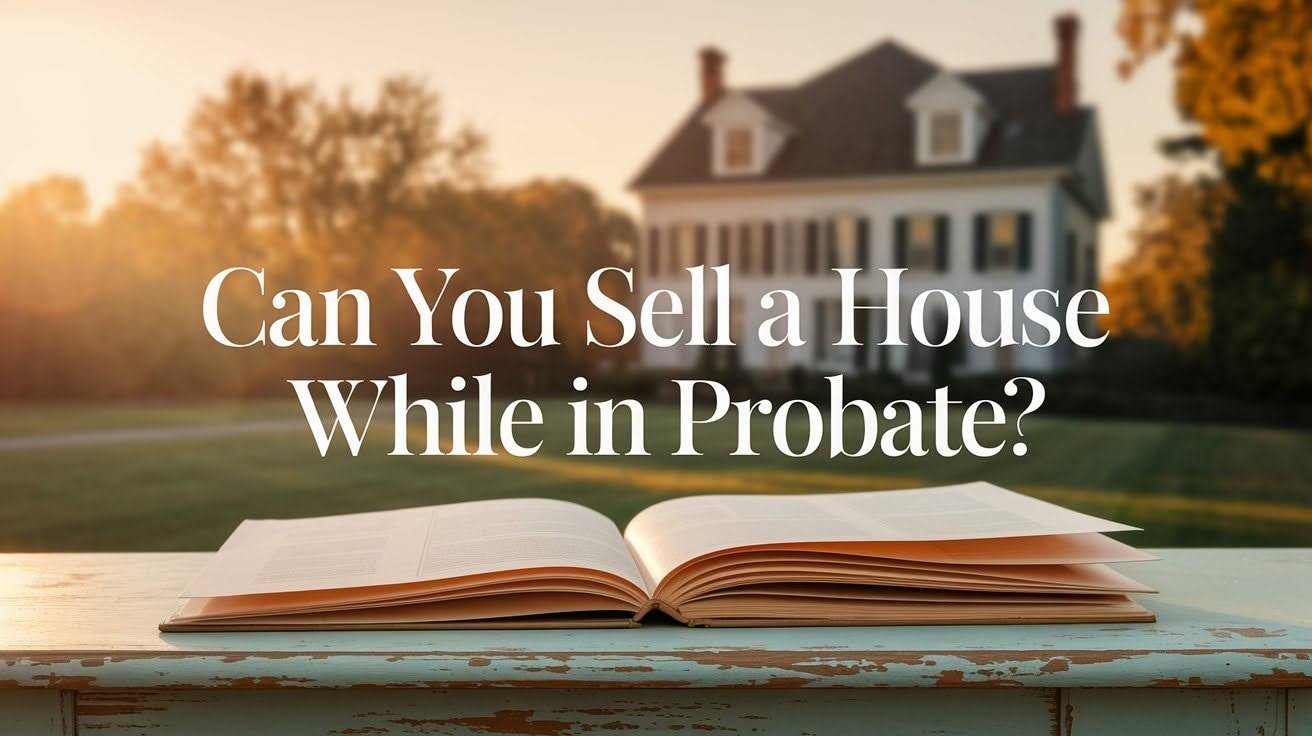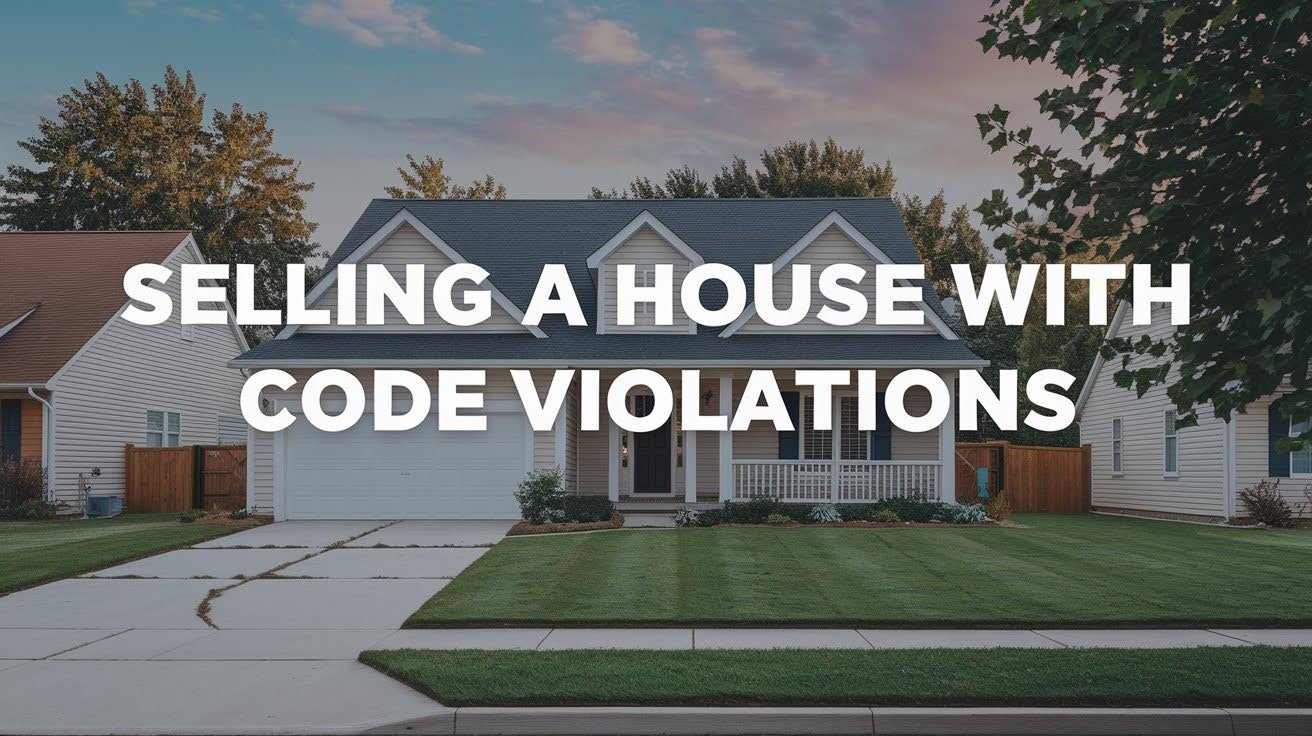You may be unsure what to do with the house you inherited. What do I do with this house I inherited? One of the first questions a family hears when there’s an inheritance is Can we sell this house now?
Yes, you can sell a house in probate, but it’s not quite as simple as selling a house on the open market in the conventional way. In that case, you will need to go through the court process and follow the legal procedures, such as notifying all the estate’s beneficiaries.
Probate sales can likewise save immediate costs by relieving estate obligations (such as mortgages, taxes, and maintenance) that would need to be handled separately, and they also save family members time. This guide provides concise instructions. Follow it to navigate the process smoothly and responsibly.
What is Probate?

Probate is the legal process that happens after someone dies. The court reviews the deceased person’s will, checks all their property and debts, and makes sure everything goes to the right people. This process keeps things fair and legal for everyone involved.
The probate court also validates the will if there is one. They make a list of all assets, pay any outstanding debts, and then distribute what’s left to the heirs. Think of it as the court making sure everything is done properly and legally.
This process usually takes 6 to 12 months, but complex estates can take much longer. The timeline depends on how many assets exist, whether anyone contests the will, and how quickly paperwork gets processed. Your state’s laws also affect how long probate takes.
When Can You Sell a House in Probate?
Timing matters a lot when you want to sell a house while in probate. Before probate starts, you cannot sell the property because no one has legal authority yet. The house must officially enter the probate process first.
During probate, you can sell the house with the right authorization and court approval. This is when most probate sales happen. The executor or administrator gets permission from the court to list and sell the property.
After probate closes, you have full ownership and can sell without restrictions. At this point, it’s just like selling any other house you own. You won’t need court approval or special paperwork anymore.
Who Has Authority to Sell a House in Probate?
The executor named in the will usually has the power to sell probate property. If there’s no will, the court appoints an administrator to handle the estate. Both need official documents called Letters of Testamentary or Letters of Administration.
Sometimes heirs or beneficiaries can sell the property, but only under court supervision. They need to get permission first and follow strict rules. The court watches carefully to make sure the sale is fair to everyone involved.
In rare cases, the court itself orders the sale of property. This usually happens when there are disputes among heirs or when debts must be paid. The court takes control to protect everyone’s interests and ensure a fair outcome.
The Probate Property Sale Process
Selling a house during probate follows a specific order of steps that you must complete correctly.
Step 1: Appointment of Executor or Administrator
Someone must file a petition with the probate court to start the process. This petition asks the court to officially recognize the person who will manage the estate. You’ll need the death certificate, the will (if there is one), and other important documents.
The court reviews the petition and appoints a personal representative. This person becomes the executor (if named in the will) or administrator (if no will exists). They receive legal authority to handle all estate matters, including property.
Once appointed, the representative can start managing estate assets. They can access bank accounts, secure property, and begin the process of selling real estate. This appointment is the foundation for everything that comes next.
Step 2: Property Appraisal and Valuation
A certified appraiser must evaluate the property to determine its worth. This isn’t optional-the court requires an official appraisal for probate sales. The appraiser looks at the home’s condition, location, and recent sales of similar houses nearby.
This appraisal establishes the fair market value of the house. The appraised value protects heirs by making sure the property sells for a reasonable price. It also helps the court decide if offers are acceptable.
The appraisal sets the minimum sale price, usually around 90% of the appraised value. This rule stops the executor from selling the house too cheaply. If you get offers below this amount, the court probably won’t approve them.
Step 3: Obtaining Court Permission
You must file a petition with the court asking for permission to sell the property. This petition explains why the sale is necessary and includes details about the house. Different states have different requirements, so check your local rules carefully.
The required paperwork varies based on your state and the type of probate. Some states need extensive documentation, while others keep it simpler. Your probate attorney can tell you exactly what forms you need to submit.
Wait for court approval before listing the house for sale. Listing or selling without permission can cause serious legal problems. Once the court says yes, you can move forward with confidence.
Step 4: Listing and Marketing the Property
The listing must clearly state that this is a probate sale. Buyers need to know because probate sales work differently from regular sales. This transparency helps set proper expectations from the start.
Work with a real estate agent who knows how to handle probate sales. These agents understand the extra steps and paperwork involved. Their experience can speed up the process and help avoid mistakes.
Most probate properties sell in “as-is” condition. This means you won’t make repairs before selling. Buyers know they’re getting the house in its current state, which can actually speed up the sale.
Step 5: Accepting Offers and Closing
All offers must go to the court for approval before you accept them. You can’t just pick an offer and close the deal like a normal sale. The court reviews offers to make sure they’re fair and reasonable.
In formal probate, other buyers can outbid the accepted offer at a court hearing. This overbidding process can push the final price higher. It protects the estate, but it can feel frustrating for the original buyer.
The court must give final confirmation before closing can happen. Once approved, the sale moves forward to closing just like any other real estate transaction. The proceeds go into the estate to pay debts and distribute to heirs.
Formal vs. Informal Probate Sales
The type of probate process affects how much court involvement you’ll need when selling the house.
Formal Probate Process
In formal probate, the court supervises every step of the sale. You’ll file multiple petitions and attend court hearings throughout the process. This close supervision protects everyone but takes more time.
You must hire an attorney for formal probate,e it’s required by law in most states. The attorney handles all court filings and represents the estate at hearings. Their fees come from the estate before heirs receive anything.
The sale includes a public auction or bidding process at a court hearing. The first overbid must be at least 105% of the original offer plus $500. After that, bids increase by $5,000 to $10,000 intervals until no one bids higher.
Informal Probate Process
Informal probate requires less court oversight for property sales. You still need court approval, but there are fewer hearings and less paperwork. This streamlined process works well for simpler estates without conflicts.
This process often applies to property held in joint tenancy with right of survivorship. It also works for houses held in living trusts. These ownership types have built-in transfer mechanisms that simplify things.
There’s no public auction process in informal probate. Once the court approves your offer, that’s the final sale price. No one can swoop in at the last minute with a higher bid.
Formal Probate Process vs Informal Probate Process
| Feature | Formal Probate | Informal Probate |
| Court Supervision | The court supervises every step and requires multiple hearings | Minimal court oversight with fewer hearings required |
| Attorney Required | Attorney representation is mandatory in most states | An attorney may not be required, depending on state laws |
| Sale Method | Public auction with overbidding at a court hearing | No public auction accepted offer is final |
| Overbidding Rules | First overbid: 105% + $500 subsequent bids: $5,000-$10,000 intervals | No overbidding allowed |
| Timeline | Often 6+ months from start to finish | Typically, weeks to a few months |
| Best For | Complex estates, contested wills, or when disputes exist | Simple estates, uncontested situations, joint tenancy properties |
| Cost | Higher costs due to attorney fees and court costs | Lower costs with less legal involvement |
Which Process Applies to Your Situation?
The type of probate depends mainly on how the property was titled. If the deceased owned it alone, you’ll likely need formal probate. Joint ownership or trust property might qualify for informal probate instead.
Your state’s laws play a huge role in determining the process. Each state has different rules about when formal or informal probate applies. Check with a local probate attorney to know which path you’ll follow.
The size and complexity of the estate matter too. Large estates with many assets often require formal probate for better oversight. Smaller, simpler estates might qualify for the faster informal process.
Special Circumstances When Selling a House in Probate
Some situations make selling probate property more complicated and require extra attention.
Selling a House with a Mortgage During Probate
If there’s a traditional mortgage on the house, it gets paid from the sale proceeds first. The lender must receive their money before heirs get anything. This happens automatically at closing when the title company handles all the paperwork.
Reverse mortgages work differently and must be paid back quickly after death. These loans have strict timelines, often just 6 months. You might need to sell fast or refinance to avoid foreclosure on the property.
The executor needs to find out exactly how much is owed on any mortgages. Contact the lender for a payoff statement that shows the current balance. This amount gets subtracted from the sale price to calculate what heirs will receive.
Selling a House That Needs Repairs
Many probate houses need work because the previous owner was elderly or sick. Years of deferred maintenance pile up when someone can’t keep up with home repairs. This is normal and very common in probate situations.
You have two main choices: fix the house before selling or sell it as-is. Making repairs can increase the sale price, but it takes time and money. Selling as-is gets the house sold faster but might bring lower offers.
Think carefully about whether repairs will actually pay off during probate. Some fixes give you back more money than you spend, while others don’t. A real estate agent can help you figure out which repairs make financial sense.
Dealing with Estate Debts
Sometimes you must sell the house to pay the deceased person’s debts. The estate owes money to creditors before heirs can inherit anything. If there’s not enough cash in the estate, selling property becomes necessary.
Creditors have a certain amount of time to file claims against the estate. These claims must be paid before assets are distributed to heirs. The executor reviews each claim to make sure it’s valid and proper.
Debts get paid in a specific priority order set by state law. Funeral expenses and estate administration costs usually come first. Then secured debts like mortgages, followed by taxes, and finally unsecured debts like credit cards.
How to Avoid Probate for Real Estate
Planning can help your heirs skip the probate process entirely for real estate.
Joint Tenancy with Right of Survivorship lets property transfer automatically to the surviving owner when one dies. No probate court gets involved at all. This option works great for married couples who own their home together.
- Living Trusts allow the trustee to manage property transfers according to the trust document. The property bypasses probate completely because the trust owns it, not the deceased person. Selling trust property doesn’t require court approval or supervision.
- Transfer-on-Death Deeds (also called beneficiary deeds) automatically transfer property to named beneficiaries at death. Only certain states allow these deeds, so check if yours does.
- Life Estate Deeds let you keep the right to live in the house while naming who gets it after you die. When you pass away, ownership transfers automatically to the named person. This avoids probate while letting you stay in your home.
- Proper Titling of property is one of the easiest ways to avoid probate headaches. Talk to an estate planning attorney about the best way to title your real estate. The right titling now saves your family time and money later.
- Regular Estate Plan Updates keep your wishes current as life changes. Review your plan every few years or after major life events like marriages, divorces, or births. Old plans might not reflect your current situation or state laws.
- Professional Legal Advice helps you choose the best probate-avoidance strategy for your specific situation. Estate planning attorneys know all the options and can customize a plan for you.
Conclusion
So, can you sell a house under probate? Yes, you can sell a home under probate (provided the proper procedures are followed). Court approval and the participation of appropriate professionals may be required. You may need to know what the law requires in your state.
The case law on the property at issue, the assets of the estate, and applicable state law are all different. Thus, one approach might work in one case and not in another. Just so you know, if you’re selling a house, I think that is important. That is why I tell you.
Working with a qualified probate attorney may also help make this process easier and save you time because an attorney is familiar with the local procedures and will ensure all paperwork is in order.
Frequently Asked Questions
How long does it take to sell a house in probate?
The timeline varies from a few months to over a year, depending on the probate type. Formal probate with court supervision takes 6-12 months minimum. Informal probate moves faster, often closing in 2-4 months once you have court approval.
Can heirs live in the house during probate?
Yes, heirs can usually live in the probate house with the executor’s permission. They may need to pay rent to the estate or cover utilities and maintenance. The executor must approve this arrangement and ensure it doesn’t harm the estate’s interests.
What happens if you sell a house in probate below market value?
The court typically rejects offers below 90% of the appraised value. Selling too low can lead to legal challenges from other heirs. The executor may face personal liability for intentionally selling property at unfair prices that harm the estate.
Do you pay capital gains tax on probate property sales?
The property receives a stepped-up basis to its value at death, reducing capital gains. If you sell near the appraised value, capital gains are usually minimal or zero. Any profit above the stepped-up basis is taxable to the estate or heirs.
Can you sell a house while in probate without all heirs agreeing?
The executor has the authority to sell with court approval, even without unanimous heir consent. However, heirs can object to the sale in court. The judge decides whether the sale should proceed based on what’s best for the estate overall.





